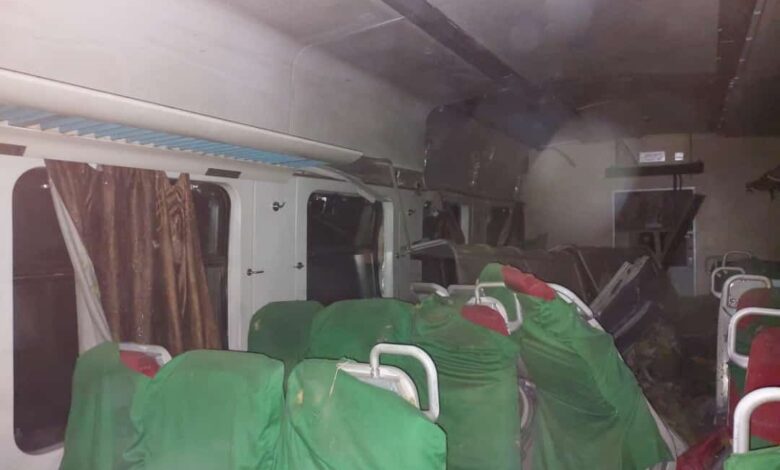#KadunaTrainAttack: Gov’t Must Explore Other Forms Of Intelligence Gathering — Experts
The Nigerian government is heavily reliant on security agency reports when there are other forms of intelligence gathering that could help prevent incessant terror attacks, security experts say.

A security analyst has advised the Nigerian Government to look beyond relying on intelligence reports supply by its security agencies if it must succeed in the war against terrorism.
Kabir Ahmed, a security analyst, said during a Twitter Space organised by HumAngle “When operational intelligence is easily obtained, the Nigerian Government tends to discard it or treat it as lacking in integrity or inconsequential.”
During the Twitter space titled ‘Kaduna Train Attack: What Happened And The Way Forward’ hosted on Saturday, April 2, Ahmed said the Nigerian government keeps relying on security agencies’ reports while there are other forms of intelligence that can prevent incessant terror attacks.
“We cannot only acknowledge security agencies as the factor for early warning alerts, we cannot say security agencies’ reports are the only factors to consider,” he said while reflecting on the train attack by terrorists.
HumAngle reported how on Monday, March 28, a terror group carried out a deadly attack on a train transporting passengers from Abuja, Nigeria’s capital to Kaduna, Northwest Nigeria. Currently, over 100 passengers are yet to be accounted for after terrorists used explosives to stop the train, shot and abducted some passengers.
Ahmed explained that a strategic intelligence-driven country is guided not just by security agencies’ reports but a combination of credible daily reports from independent media where a pattern can be drawn.
“Independent media and investigative journalism are central to fighting against terrorism,” he said.
“When you properly analyse credible daily reports, they can serve as early warning signals for security operatives. These alone can tell you the pattern movements, the change, and evolution in the actions of these terrorist groups.”
Murtala Abdullahi, HumAngle’s senior security reporter who also spoke during the Twitter Space said intelligence cycle is broad and does not limit understanding of trends to state actors.
“To solve a puzzle, you need several components and alot of it sometimes do not come from states’ resources; it includes harnessing other forms of information that’s being disseminated,” Abdullahi argued.
He cited a similar incident which happened on Oct. 21 2021 where suspected terrorists used explosives on the rail line and fired bullets at the train.
“That in itself was an early warning signal. Let’s assume that the system does not have the capacity to gather intelligence, that incident in October was sufficient warning for the state to invest in building capacity to prevent a future one.”
Ahmed noted that terror attacks are evolving swiftly, stressing that the typical mode of terror operation was to intercept road travelers or kidnap people in their homes.
Nigerians, for their safety, he said, have resorted to taking the train or traveling by air.
However, on Saturday, March 26, terrorists reportedly invaded the Kaduna airport killing one person and preventing a plane from taking off which indicated traveling by air was no longer safe in Kaduna.
Ahmed stated that it was a successful attack on the part of the terrorists and it was the biggest statement a terror group could make.
“We have seen them [terrorist] become sophisticated in their attacks and more brutal. For the government to allow such an attack to happen successfully, to allow terrorists set a new standard in their operations, then we can only imagine how strategic and how modernised they have become, we can only imagine how coordinated their next attack will be.”
According to him, Rijana, where the terrorists intercepted the train, is known for its notoriety because residents of Rijana have in the past decried the presence of terrorists in their midst which was ignored.
“The government needs to identify these hot zones between Kaduna and Abuja, and set up permanent police bases. It is time for the police to step up, take up these regions and, stay there for as long as we can fight off these terrorists,” he said.
Support Our Journalism
There are millions of ordinary people affected by conflict in Africa whose stories are missing in the mainstream media. HumAngle is determined to tell those challenging and under-reported stories, hoping that the people impacted by these conflicts will find the safety and security they deserve.
To ensure that we continue to provide public service coverage, we have a small favour to ask you. We want you to be part of our journalistic endeavour by contributing a token to us.
Your donation will further promote a robust, free, and independent media.
Donate HereStay Closer To The Stories That Matter




